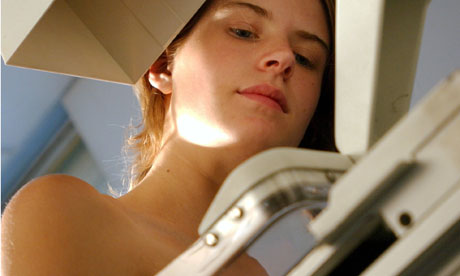Cancer diagnoses in middle-aged men and women have soared by nearly 20% in a generation as screening picks up more cases and smoking, drinking, obesity and unfitness continue to take a toll. In 1979, the incidence was 328 cases per 100,000 among people aged 40-59, while by 2008 the rate was 388 per 100,000.
In absolute numbers, an extra 17,000 cancer cases are being diagnosed every year among this age group, according to Cancer Research UK (Cruk), Britain's biggest cancer charity. In 1979, there were 44,000 diagnoses in the age group but that had risen by 38% to nearly 61,000 by 2008, according to the latest figures.
Women have experienced a bigger rise in cancer rates than men, with diagnoses among the age group rising by 26%, based on an incidence of 363 per 100,000 in 1979 rising to 459 per 100,000 in 2008. In absolute numbers the rise was more than 50%, with 24,000 cases in 1979 but more than 36,500 in 2008. The increase in male cancers was from almost 20,000 to 24,000.
The two major reasons for the rise are screening and lifestyle. More cancers that would not have been spotted in middle age in the past are now being detected and treated.
Early treatment will have saved many lives – Cruk's figures show survival has doubled since the 1970s.
The rise in cases among middle-aged women has much to do with the advent of a national breast-screening programme for those aged over 50.
"From the late 1970s onwards, there was a steady rise in breast cancer cases every year but, after screening began in 1988, there was a very dramatic increase, as previously undiagnosed cancer was detected," said Dr Julie Sharp, Cruk's senior science information manager.
Prostate cancer screening has also pushed up the cancer rate among men, even though the prostate-specific antigen blood test is not offered through a screening programme.
"In the late 1980s and early 1990s, a lot more men could request the test from their GP," said Sharp. "We are picking up a lot more prostate cancers, but we are picking up very mild prostate cancers which might not do long-term harm. There are difficulties around that."
Prostate cancer is often very slow to develop and can be something a man can live with. The consequences of treatment are sometimes severe, so doctors often advise "watchful waiting" instead.
There is also a real rise in cancers – even after the inflationary effect of screening is taken into account – caused by Britain's increasingly unhealthy lifestyle, as people eat and drink more and sit in front of the TV rather than taking exercise.
"We know lots more now about lifestyle factors [in breast cancer]," said Sharp, "such as women being overweight, having few children, not breastfeeding and drinking alcohol."
Changing patterns in other cancers also reflect lifestyle influences. Lung cancer rates in men have dropped, as many have stopped smoking. Among men aged 40-59, the number with lung cancer fell from 6,300 in 1979 to 2,700 in 2008.
However, malignant melanoma cases caused by excessive sun exposure and sunbed use have gone up. It is the fastest rising common cancer in middle-aged women, with an increase of more than 200% – from 8.9 cases per 100,000 in 1979 to 24.9 per 100,000 in 2008.
Cruk released the figures as part of a new advertising campaign.
"There has been undeniable progress in the treatment of cancer over the last 40 years and many more people are surviving the disease," said Harpal Kumar, Cruk's chief executive.
"But we must redouble our efforts to ensure that our research continues to discover new techniques to improve and refine diagnosis and treatment so that cancer survival becomes the norm for patients, irrespective of the cancer they have or their age at diagnosis.
"It is entirely due to the amazing generosity of the public that we are able to support the work of the 4,000 dedicated doctors, nurses and scientists who continue to unlock the secrets of a disease that affects us all.
"As cancer incidence rises and the economy tightens, we need their support now more than ever."
• This article was amended on 18 July 2011. The original omitted to explain that the rise of almost 20% in cancer diagnosis between 1979 and 2008 was based on the rate per 100,000 people. Similarly a rise in cancer diagnoses among women, given as 25%, was based on the rate per 100,000 in the same period.









